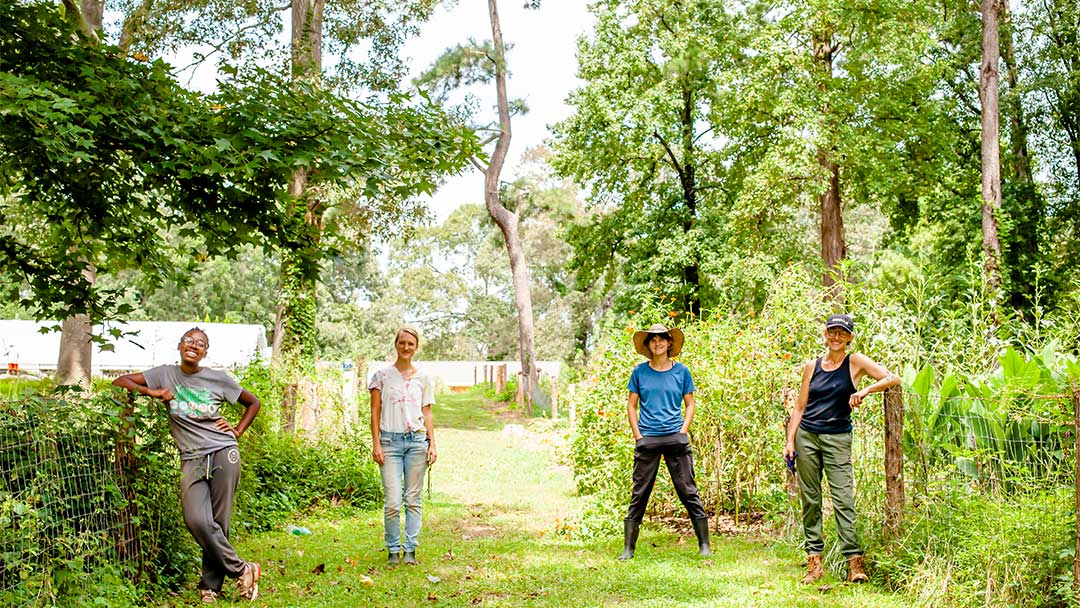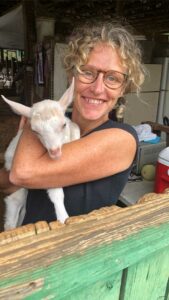
For their first pro-bono initiative, Juniperus built the digital presence for Grassroots Growers Alliance. Started by Atlanta-native Tania Herbert, GGA grew from her passion for urban agriculture and helping communities cultivate a local source of healthy food.
What prompted your interest in urban agriculture?
Our first foray into sustainable ag was a school composting program. We were amazed at how our food scraps were transformed into beautiful soil. For me, it was the gateway to growing as I suddenly understood the cycle of growing, harvesting, and eating and the necessity of composting in order to return nutrients back to the soil to grow more food.
 What does food sovereignty mean to you?
What does food sovereignty mean to you?
You can be food secure but not have access to fresh, healthy food. It really matters where your calories come from. Communities with limited or no access to healthy food are at increased risk of diet-related diseases. I would like to see a more equitable and localized food system where our communities are involved in the production, distribution and consumption of quality food that is grown using sustainable practices. Growing good food closer to home would promote greater vibrancy and good health at the community level.
How has COVID-19 exacerbated these already existing conditions?
Families who were already struggling to put food on the table have been hit hard during the pandemic and more people are accessing food pantries to feed their families. The fragility and unfairness of our industrial and global food system became really apparent during this health crisis and has highlighted the need for a more resilient model. When the food disappeared from the grocery stores during COVID, our local farmers were able to close that gap and feed our families nutritious food. We need to take these lessons we are learning and invest in a more equitable and localized food system that serves everyone.
Why did you want to start GGA?
Creating an alliance of farms solidified the existing relationships we were building across the diverse communities we were working with. The Paideia School, Purpose Built Schools Atlanta (Thomasville Heights Elementary) and the Women’s Transitional Center had been working together to build farms that could be used as educational platforms and training programs. We were growing and learning together and creating jobs and other opportunities for our communities. Formalizing our collaborative framework enabled us to share more resources and grow more food for our communities. It also provided a way to forge meaningful relationships with communities that we may not have otherwise interacted with and it has created a greater sense of place for all of us.
 What are some of the challenges you’ve encountered while being a woman in this field?
What are some of the challenges you’ve encountered while being a woman in this field?
Honestly, it’s been more of a personal challenge. I received a lot of support from The Paideia School from the start. They saw value in connecting our students to where their food comes from and made it a priority to encourage young people to be active agents in the creation of the world they want to live in. I have received valuable mentorship from other local farmers and organizations who have paved the way for GGA in a number of ways. My personal journey was to learn to have confidence in myself and not worry what other people think—I still worry that people think I’m crazy, but now I can see that being a little odd is one of my strengths. I believe if you are going to create real change, you are going to have to take a few risks, challenge the status quo and tap into some entrepreneurial spirit to be successful.
How can our readers get involved in the fight to eliminate food insecurities?
Buying from our local farmers and supporting organizations like Wholesome Wave, who offset the costs of healthy food for families through SNAP benefits while ensuring farmers are paid for their work is a great start. We also really need to start investing in communities that have been historically subjected to injustices resulting in reduced access to resources and opportunities that lead to food insecurity. Supporting the leaders and organizations in these communities will redirect much-needed resources to promote food security, increased economic opportunities, and academic success for children and their families. GGA partners with a lot of amazing groups like Gangsters to Growers – The Come Up project, HABESHA, Greening Youth, EverybodyeatsAtl, and Global Growers Network. All of these organizations are working to create a more equitable food system (and realize the associated benefits that accompany it) for their communities.
What advice would you give to young people who want to make a difference in the world but aren’t sure how?
Reach out to local organizations that are challenging racial inequality in the area of your interest. There is too much talk and not enough action—it is time to get involved. There’s no need to reinvent the wheel, I guarantee there are community leaders out there who are already working on tons of important things and need your support. We can accomplish a lot together. Who would have thought a small private school, a title one school, and a women’s transitional facility would become leaders in food justice!
What has been your favorite part about working with Juniperus?
Meetings are always such a pleasure, I always end up laughing and feeling like our work is valued. Amber and Alicia are truly interested in the work GGA is doing and want to support it. They bring skills that our team does not have and we are extremely thankful they have been supporting our efforts.

Alicia Harper
Co-Founder, Juniperus
As Juniperus’ co-founder, Alicia is the very definition of our brand—young and always evolving—continually building depth to our client’s stories while bringing fresh and new ideas to the table.
